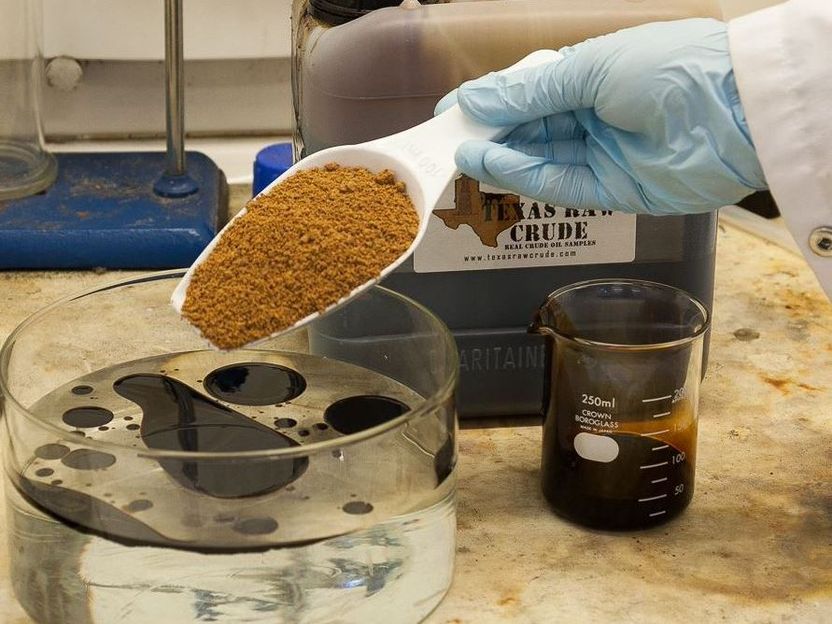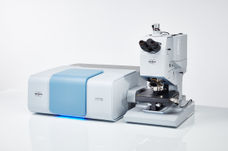Slick solution for oil spills set to clean up
Polluted beaches, oily water, dead birds and marine life destruction caused by crude oil spills could be a thing of the past with pioneering new research led by Flinders University.

Dr Chalker adds the polysulfide to the crude oil sample.
Flinders University
An exciting, more sustainable answer to effectively clean up oil spill destruction follows development of a new way to quickly soak up crude oil with an absorbent polymer – itself made from waste products from the petroleum and refining industries. In an environmental win-win, the new type of polymer made from waste cooking oil and sulphur (a by-product of the petroleum industry) has the ability to clean up crude oil and diesel spills.
Better still, because this highly buoyant polymer acts like a sponge to absorb the waste materials from sea water, the polymer can be squeezed to recover the oil and then reused. Award-winning scientist Dr Justin Chalker, Senior Lecturer in Synthetic Chemistry at Flinders University, is leading an international research team responsible for the discovery.
He is delighted that chemists are finding new ways to provide cheap and effective solutions to curb the damage caused by oil spills, and even mercury in the environment. “This is an entirely new and environmentally beneficial application for polymers made from sulphur,” says Dr Chalker. “This application can consume excess waste sulfur that is stockpiled around the globe and may help mitigate the perennial problem of oil spills in aquatic environments.”
Oil spills are a major global issue, with the International Tanker Owners Pollution Federation reporting about 7000 tonnes of crude oil spilling from tankers into oceans in 2017 alone.
A recent large oil spill off Borneo, for example, and prompted Indonesian authorities to declare a State of Emergency.
The international team of researchers point to the effects of recent large-scale spillage catastrophes as a potent reason for their research and potential use in the field – in particular, the explosion on the Deepwater Horizon offshore drilling rig on 20 April 2010 and subsequent release of approximately 4.9 million barrels of crude oil into the Gulf of Mexico.
Hundreds of smaller spills of diesel fuel and other petroleum products affect developing countries in Africa, Asia and South America, for example in the Niger Delta and Amazon basin of Ecuador. The new material made from cheap and sustainable products will help respond to these developing countries where smaller, localised spills threaten groundwater, drinking water and important food staples such as fish.
“This is a new class of oil sorbents that is low-cost, scalable, and enables the efficient removal and recovery of oil from water,” says Dr Chalker.
Original publication
M. J. H. Worthington, C. J. Shearer, L. J. Esdaile, J. A. Campbell, C. T. Gibson, S. K. Legg, Y. Yin, N. A. Lundquist, J. R. Gascooke, I. S. Albuquerque, J. G. Shapter, G. G. Andersson, D. A. Lewis, G. J. L. Bernardes, J. M. Chalker; "Sustainable Polysulfides for Oil Spill Remediation: Repurposing Industrial Waste for Environmental Benefit"; Adv. Sustainable Syst.; 2018
Original publication
M. J. H. Worthington, C. J. Shearer, L. J. Esdaile, J. A. Campbell, C. T. Gibson, S. K. Legg, Y. Yin, N. A. Lundquist, J. R. Gascooke, I. S. Albuquerque, J. G. Shapter, G. G. Andersson, D. A. Lewis, G. J. L. Bernardes, J. M. Chalker; "Sustainable Polysulfides for Oil Spill Remediation: Repurposing Industrial Waste for Environmental Benefit"; Adv. Sustainable Syst.; 2018
Topics
Organizations
Other news from the department science
These products might interest you

Eclipse by Wyatt Technology
FFF-MALS system for separation and characterization of macromolecules and nanoparticles
The latest and most innovative FFF system designed for highest usability, robustness and data quality

Spinsolve Benchtop NMR by Magritek
Spinsolve Benchtop NMR
Spinsolve is a revolutionary multinuclear NMR spectrometer that provides the best performance

HYPERION II by Bruker
FT-IR and IR laser imaging (QCL) microscope for research and development
Analyze macroscopic samples with microscopic resolution (5 µm) in seconds

Get the chemical industry in your inbox
By submitting this form you agree that LUMITOS AG will send you the newsletter(s) selected above by email. Your data will not be passed on to third parties. Your data will be stored and processed in accordance with our data protection regulations. LUMITOS may contact you by email for the purpose of advertising or market and opinion surveys. You can revoke your consent at any time without giving reasons to LUMITOS AG, Ernst-Augustin-Str. 2, 12489 Berlin, Germany or by e-mail at revoke@lumitos.com with effect for the future. In addition, each email contains a link to unsubscribe from the corresponding newsletter.



























































